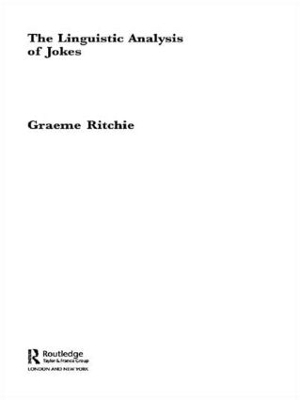
The Linguistic Analysis of Jokes
Seiten
2014
Routledge (Verlag)
978-1-138-00873-1 (ISBN)
Routledge (Verlag)
978-1-138-00873-1 (ISBN)
Graeme Ritchie advocates a cognitive science approach to humour research, aiming for higher levels of detail and formality than has been customary in humour research, and argues the case for analyzing jokes and humour.
This book starts from three observations. First, the use of humour is a complex, puzzling, and idiosyncratically human form of behaviour (and hence is of scientific interest). Second, there is currently no theory of how humour works. Third, one useful step towards a theory of humour is to analyze humorous items in precise detail, in order to understand their mechanisms.
The author begins by considering how to study jokes rigorously: the assumptions to make, the guidelines to follow and the pitfalls to avoid. A critique of other work on humour is also provided. This introduces some important concepts, and also demonstrates the lack of agreement about what a theory of humour should look like. The language devices used in various jokes, such as puns or humour based on misinterpretation, are analysed in detail. The central part of the book develops, and demonstrates, proposals for how best to analyze the workings of simple jokes. Finally, the author makes some general suggestions about the language devices that seem to be central to the construction of jokes.
The Linguistic Analysis of Jokes will be invaluable for researchers and advanced students of humour research, linguistics and cognitive science.
This book starts from three observations. First, the use of humour is a complex, puzzling, and idiosyncratically human form of behaviour (and hence is of scientific interest). Second, there is currently no theory of how humour works. Third, one useful step towards a theory of humour is to analyze humorous items in precise detail, in order to understand their mechanisms.
The author begins by considering how to study jokes rigorously: the assumptions to make, the guidelines to follow and the pitfalls to avoid. A critique of other work on humour is also provided. This introduces some important concepts, and also demonstrates the lack of agreement about what a theory of humour should look like. The language devices used in various jokes, such as puns or humour based on misinterpretation, are analysed in detail. The central part of the book develops, and demonstrates, proposals for how best to analyze the workings of simple jokes. Finally, the author makes some general suggestions about the language devices that seem to be central to the construction of jokes.
The Linguistic Analysis of Jokes will be invaluable for researchers and advanced students of humour research, linguistics and cognitive science.
Graeme Ritchie has been carrying out research in artificial intelligence and computational linguistics since 1973, investigating topics such as morphology, parsing, semantics and creativity. In recent years, he has helped to pioneer the computer modelling of verbal humour. He is Honorary Senior Research Fellow at the University of Aberdeen, UK.
1. Introduction 2. Assumptions and Methodology 3. Linguistic preliminaries 4. Incongruity and its Resolution 5. Two Models of Incongruity-Resolution 6. The General Theory of Verbal Humour 7. Joke Similarity and Identity 8. Manipulating Interpretations 9. The Structure of Puns 10. Some Computational Studies 11. Pragmatic and Discourse Issues 12. Speculations on Joke Structure 13. Future Directions
| Erscheint lt. Verlag | 27.2.2014 |
|---|---|
| Reihe/Serie | Routledge Studies in Linguistics |
| Verlagsort | London |
| Sprache | englisch |
| Maße | 156 x 234 mm |
| Gewicht | 385 g |
| Themenwelt | Literatur ► Comic / Humor / Manga |
| Schulbuch / Wörterbuch ► Wörterbuch / Fremdsprachen | |
| Geisteswissenschaften ► Philosophie ► Sprachphilosophie | |
| Geisteswissenschaften ► Sprach- / Literaturwissenschaft ► Anglistik / Amerikanistik | |
| Geisteswissenschaften ► Sprach- / Literaturwissenschaft ► Literaturwissenschaft | |
| Geisteswissenschaften ► Sprach- / Literaturwissenschaft ► Sprachwissenschaft | |
| ISBN-10 | 1-138-00873-7 / 1138008737 |
| ISBN-13 | 978-1-138-00873-1 / 9781138008731 |
| Zustand | Neuware |
| Haben Sie eine Frage zum Produkt? |
Mehr entdecken
aus dem Bereich
aus dem Bereich
Aspekte einer Ontologie des Logos
Buch | Hardcover (2024)
Springer Fachmedien (Verlag)
119,99 €
Wie die Menschheit zu ihrer größten Erfindung kam
Buch | Softcover (2022)
C.H.Beck (Verlag)
18,00 €
Macht und Legitimität politischer Sprache im Prozess der europäischen …
Buch | Softcover (2023)
Nomos (Verlag)
74,00 €


